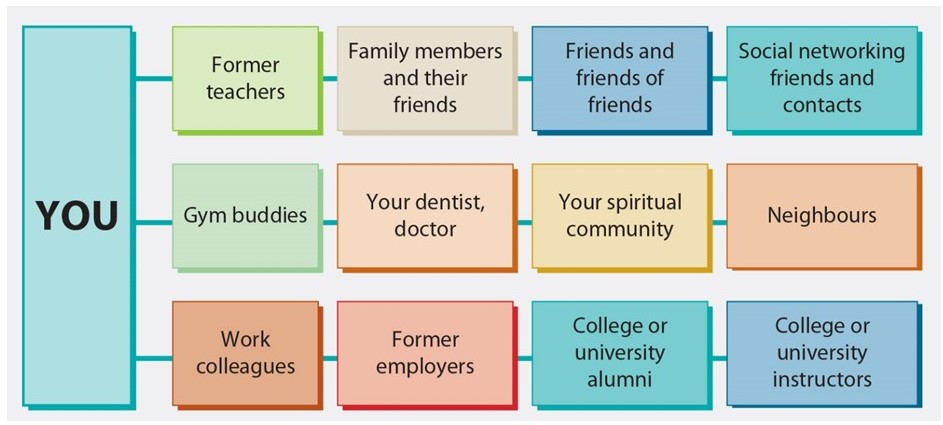Jordan Smith and Carla Zimmerman
Job Search Strategies
Finding a job in this very competitive job market may require the use of traditional and non-traditional strategies. Some of these strategies are examined here.
Networking
A recent study showed that approximately 61% of job seekers either used their personal network and/or online social network to land their dream job (Guffey et al., 2019). What exactly is a personal network and why is it so effective? A is a group of people with whom you have a personal relationship based on similar interests. As you build this network and cultivate the relationships, you develop a connection and most importantly trust with your the people in your network. These relationships come in very handy because the majority of the job market is hidden, that is, jobs that are not advertised through conventional avenues. Most jobs are often found through referrals and word of mouth; thus, having a network of people that can give you inside information about available jobs in your field is invaluable. In addition to the inside information, people in your network also serve as personal references and a bridge between your potential employer and you. Some tips to help you develop a personal network include:
- Develop a list of people to speak with about your job search
- Contact the people on your list
- Call and possibly arrange a meeting with any referrals provided by your contact list
- Join an online networking group
- Conduct research on additional networking tips and trends

Using Your Network to Find a Job
How do you use your network to help you find a job? There are two important ways that your network can help you in your job search. First, simply letting people know that you are looking for work can lead to opportunities. If people know of open positions that fit your interests, they may send you information to apply. If they are willing and able to provide a referral or recommendation, it can boost your chances of getting that job! Social media websites can be particularly helpful for this – an occasional post reminding others that you are looking for work will keep you at the top of their minds when they hear of positions.
The second way your network can help you find a job is through informational interviewing. An informational interview is a meeting with a person whose career you are interested in. During this meeting, you ask for job-related information, such as:
- How did you get into this career?
- What knowledge, skills, and background are helpful for breaking into this field?
- What advice do you have for someone interested in this kind of career?
The answers to these questions can help you strengthen your preparation for a particular career, find the best places to look for job postings, learn what to expect in interviews, or determine how well a particular company or career fits with your interests. For more on informational interviewing, click here!
Online Job Sites
According to a recent Jobvite survey, job boards continue to be the number one medium to access job opportunities (Morgan, 2019). Major job search engines like Monster and Indeed are good places to start your job search process. However, both job seekers and employers have their objections to these sites. To job seekers, applying for a job through a job board can be frustrating for the following reasons:
- Some will strip out the formatting you’ve meticulously assembled for your résumé and cover letter
- Submitting confidential information about yourself to them feels risky
- They can feel like vast abysses into which you send dozens of applications you’ve labored over for hours, but without ever receiving a response back
To employers and recruiters, the big job sites attract a flood of poor-quality applicants from around the world, leaving the hiring manager or committee with the time-intensive job of sorting out the applicants worth seriously considering from the droves of under-qualified applicants taking shots in the dark with what amounts to spam applications. With such a demanding selection process, employers simply don’t have time to respond to every applicant.
Nonetheless, ignoring these sites altogether would be a mistake because too many employers use them to advertise positions. When your full-time job is just to find a full-time job, you can’t leave any stone unturned. The following are sites worth searching for job postings and other information they offer on the job market:

Job Fairs
Because colleges are a greenhouse for the emerging labor pool, they have tight connections with industry partners . When company recruiters come to your college, be there to ask them about their employment opportunities. Recruiters aren’t interested in students who aren’t interested in them. Attending career fairs and talking to recruiters is a great way of showing interest.
Job Alerts and Industry-Specific Job Boards
Interested in working for a specific company or industry? Many employers and job boards allow you to set email alerts for openings that match your specifications. Check out the Employment or Careers section of a company’s website to see if this is an option. Industry-specific job boards also typically have this functionality available.
Examples of industry-specific job boards:
- https://www.governmentjobs.com/ (local and state government)
- http://www.usajobs.com (federal government)
- http://www.higheredjobs.com (colleges and universities)
- https://coloradononprofits.org/careers/nonprofit-jobs (nonprofits in the state of Colorado)
This section contains material from 14.1 The Job Search Process in NSCC Communication Skills for Trades by Jordan Smith and is used under a
Media Attributions
- jobsearch 1
- jobsearch 3
a group of people with whom you have a personal relationship based on similar interests

